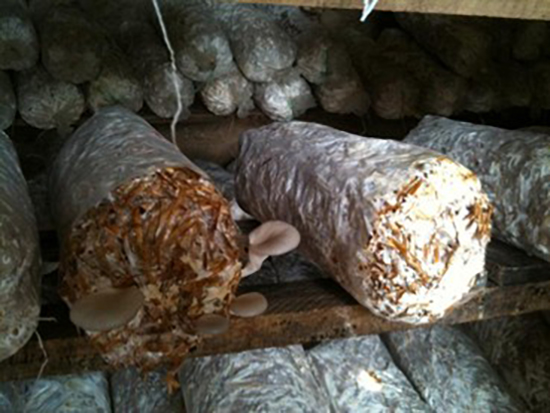The North-West University (NWU) continues to make strides in pioneering research that addresses sustainability and food security challenges across southern Africa. This year, Melokuhle Queeneth Magagula, a distinguished MSc graduate in Animal Science from the Faculty of Natural and Agricultural Sciences, has earned both national and international acclaim for her innovative research on the development of sustainable poultry feed.
Supervised by Dr DMN Mthiyane, Melokuhle’s study reflects the commitment of the NWU to advancing science that directly supports rural development, environmental stewardship and the circular bioeconomy.
Turning indigenous resources into sustainable feed
Melokuhle’s research focused on the valorisation of Vachellia erioloba pods, the fruits of an indigenous mokala tree species widely found in North West Province and other inland regions of the Southern African Development Community (SADC). Through mushroom solid-state fermentation, she explored their potential as an alternative feed resource for indigenous Boschveld chickens.
The high fibre content and the presence of antinutritional phytochemicals often limit the utilisation of Vachellia erioloba pods as nutraceutical feed additives for poultry. However, Melokuhle demonstrated that the pods can be solid-state fermented using oyster mushrooms, improving their nutritional utility as a spent substrate suitable for the diets of indigenous chickens.
Scientific experiment and methodology
The study investigated the effects of dietary incorporation of Vachellia erioloba oyster mushroom spent substrate (OMSS) on growth performance, carcass traits, visceral organs, haemato-biochemistry and meat quality, including fatty acid composition in Boschveld chickens.
In a completely randomised design, 250 four-week-old mixed-gender Boschveld chicks were randomly allotted to 25 pens. They were offered five treatment diets (with 0%, 1,25%, 2,5%, 5%, and 10% OMSS), each with five replicates of 10 birds, over a 12-week feeding trial, followed by slaughter for data collection and analysis.
Key findings and results
The study found neither linear nor quadratic effects of diet on overall feed intake or body weight gain. However, dietary OMSS incorporation decreased feed conversion efficiency, particularly during weeks 5, 6 and 11, with no effects after that.
Furthermore, OMSS inclusion did not affect carcass characteristics, visceral organs, haemato-biochemistry or meat physico-chemical quality, except for some notable differences:
· Increased serum albumin and bilirubin levels.
· Increased meat lightness, redness, yellowness, hue angle and drip loss 24-hrs after slaughtering.
· Decreased meat myristic, palmitic, palmitoleic and oleic acids, as well as total polyunsaturated fatty acids (PUFAs), monounsaturated fatty acids, and n-6 PUFAs.
· Increased meat stearic, docosahexaenoic, and tricosanoic acids, along with total saturated fatty acids and n-3 PUFAs.
Importantly, the meat n-6/n-3 PUFA ratio decreased significantly, with birds fed 2,5% OMSS achieving the lowest and most desirable ratio of 3,63.
Implications for sustainable poultry nutrition
These results demonstrate that feeding Vachellia erioloba pods-derived OMSS at 2,5% inclusion level enhances the nutritional healthiness of meat, notably improving its fatty acid composition, without majorly affecting its physico-chemical quality as well as bird growth performance, carcass traits, and haemato-biochemistry.
This research adds valuable scientific knowledge to the field of sustainable animal nutrition while offering practical solutions for smallholder and rural poultry producers. By transforming an underutilised indigenous resource into a biotechnologically enhanced feed, Melokuhle’s study promotes circular agriculture and environmental sustainability across southern Africa.
Her supervisor, Dr Mthiyane, praised the scientific rigour and regional relevance of the project, highlighting it as a model for integrating local biodiversity and biotechnology to strengthen food system resilience in the SADC region.
A trailblazer for sustainable livestock research
Graduating with distinction, Melokuhle exemplifies the mission of the NWU to nurture researchers who advance innovation, sustainability and indigenous knowledge in agricultural sciences. Her findings, published in Scientific Reports, a high-impact international journal within the Nature portfolio, underscore the position of the NWU as a leader in applied, impact-driven research addressing Africa’s food and environmental challenges.
Reflecting on her academic journey, Melokuhle shared:
“My research was inspired by the need to find sustainable, locally sourced feed options that support both our farmers and the environment. The Vachellia erioloba pods are a natural resource that, through biotechnology, can contribute meaningfully to food security and circular agriculture in Africa.”

Melokuhle Queeneth Magagula

The spent substrate (waste) from oyster mushroom cultivation1
